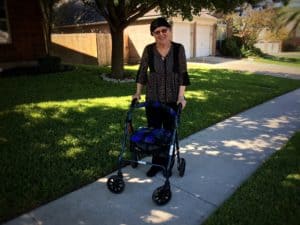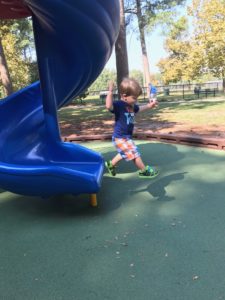
My dual journey with two challenging medical diagnoses took a new turn recently when I traveled for the first time using my walker, affectionately known as “the Cadillac.” My destination was a writers’ conference, but I learned just as much about myself and the challenges of having a disability.
Understand that it took me two years to acquiesce to the medical professionals about using a walker. Even using a cane broke my heart. It said I give up, I’ll never walk normally again. I’m disabled. I couldn’t admit such a thing. Then I took a couple of nasty falls and had to swallow the bitter pill. Primary Lateral Sclerosis (PLS) affects balance. Get over it and get on with it.
Using a walker is a whole new world because it’s not possible to use the “regular” routes from Point A to Point B used by “able-bodied” folks. I experienced on a recent trip to Grapevine what it is like to be disabled and on my own with no support from my husband or family. I apologize to everyone who has learned this lesson through having a disability for years or their entire lives. I didn’t understand what it truly means to navigate in a world where people zip up and down stairs, whip through doors, and hop onto escalators. I’m getting there now.
My first fears of the unknown were the airport and flying with my walker. American Airlines was fabulous. Truly. A sweet “helper” met me at the check-in kiosk and called for wheelchair assistance, helped me tag my bag, and showed me where to place it. The wheelchair assistant propped the walker on the side of the chair and assisted me through the TSA security check, and to my gate. I was able to check the walker at the gate so it would meet me at my destination.
One of the joys of this mode of travel is getting to talk to the wheelchair assistants. The one in DFW sat on the baggage carousel while we waited for my bag and entertained me by telling me some of the things elderly, not-so-nice-folks say to him while he pushes their chairs. Apparently, they think he drives too fast. He also mentioned he wants to study video production and was delighted to know my husband has a certificate in that field. He stayed with me all the way to the taxi, handling walker, chair, and baggage with ease.
The taxi driver, a Middle Eastern man who is studying computer technology at night, wrote down my name after he learned I was headed to a writers’ conference so he could look up my books on the Internet. He left his taxi running, door open, to take my bag all the way to the registration desk in the cavernous hotel lobby. Talk about the extra mile—literally.
I learned important lessons on this, my first walker trip, to a conference. Ask questions ahead of time. Don’t assume. I planned to use my room as a resting place during the day, to pace myself. It was my week off from chemotherapy, but the fatigue remains constant. I had no clue when they handed me the room key and told me I was in the Riverwalk wing that room 3196 was almost 200 rooms from the elevator. I had declined help from a bellman, sure I could handle this last part. So I stumbled along, pushing a walker and pulling a suitcase for what seemed like miles of endless hallway. After a half-day of travel, I was close to tears when I looked over the map of the hotel and realized the conference was in a separate convention center building. Not taking time to unpack, I took a few deep breaths, and sallied forth to locate registration, find a sandwich, and rearrange a meeting so I wouldn’t have to traipse back to the lobby.
It took me fifteen minutes to walk from my room to the convention center area where our conference was being held. Then I had to find an elevator while others took the escalator. I quickly realized I would need to plan for each day so that I wouldn’t have to return to my room; there wouldn’t be time for a thirty-minute round trip.
I had a wonderful time at the conference. The sessions were interesting and truly what I needed to hear at this stage of my career. I had great, substantive meetings with my agent and my editor. I talked to other writers. Worshiping with hundreds of other Christian writers was the highlight of the conference. It was everything I’d hoped it would be. I tried not to let the accessibility challenges cast a pall over an event I had anticipated for months. I tried to ignore (rather than learn to accept) reminders that I no longer can joyfully hike distances like I once did. It made me sad to remember how I once would have embraced the walk with flowing fountains, bridges, landscaping, and toy trains as a way to burn off the great conference meals and simp-

ly enjoy walking.
And so many others were in worse shape. It’s funny how the use of a walker or cane places you in an immediate sisterhood with others laboring with similar challenges. A couple of people said they would not have come had they known of the sprawling size of the hotel and convention center. Those of us with walkers were actually in better shape than the ones who had nothing at all to rely on. A poor lady stumbled along, obviously in pain, her face etched with concern as she tried to hurry to her next session. I wanted to help her, but didn’t know how.
Another conferee shared with me she hadn’t timed how long it took to get to the conference area but she had to stop and rest along the way. She said her “funny” conference story would be the twenty minutes it took her to figure out how to get into a bed too high for her short stature and disability. I loved that she could laugh about it. I pledged to learn to laugh too.
I saw so much good during this three-day weekend. It did my heart good. People are so kind. They open doors. They make room at tables. They carry packages. They hold elevators. Disability brings out the good in people and reminds me that God knows what He’s doing. I can’t do it alone. We’re all in this together. The more we help each other, the more we retain some of our most valuable human and Christlike traits: compassion, love, kindness, caring, and patience.
Disability isn’t a bitter pill to be swallowed, but a new way of life that leads to a closer walk with Christ. As Allen Arnold reminded us in his continuing education session, “From Chaos to Canvas,” “the goal was never for us to be independent, but dependent. This is not Plan B.” God’s using my limitations to encourage others to be helpers. The disability forces me to slow down, to talk to people, to accept their help, and learn their stories. I’m still learning these lessons. Forgive me for taking so long.
